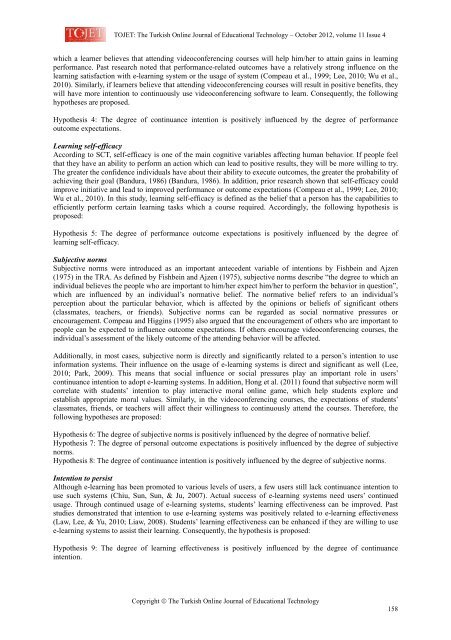october 2012 - TOJET the Turkish online journal of educational ...
october 2012 - TOJET the Turkish online journal of educational ...
october 2012 - TOJET the Turkish online journal of educational ...
Create successful ePaper yourself
Turn your PDF publications into a flip-book with our unique Google optimized e-Paper software.
<strong>TOJET</strong>: The <strong>Turkish</strong> Online Journal <strong>of</strong> Educational Technology – October <strong>2012</strong>, volume 11 Issue 4<br />
which a learner believes that attending videoconferencing courses will help him/her to attain gains in learning<br />
performance. Past research noted that performance-related outcomes have a relatively strong influence on <strong>the</strong><br />
learning satisfaction with e-learning system or <strong>the</strong> usage <strong>of</strong> system (Compeau et al., 1999; Lee, 2010; Wu et al.,<br />
2010). Similarly, if learners believe that attending videoconferencing courses will result in positive benefits, <strong>the</strong>y<br />
will have more intention to continuously use videoconferencing s<strong>of</strong>tware to learn. Consequently, <strong>the</strong> following<br />
hypo<strong>the</strong>ses are proposed.<br />
Hypo<strong>the</strong>sis 4: The degree <strong>of</strong> continuance intention is positively influenced by <strong>the</strong> degree <strong>of</strong> performance<br />
outcome expectations.<br />
Learning self-efficacy<br />
According to SCT, self-efficacy is one <strong>of</strong> <strong>the</strong> main cognitive variables affecting human behavior. If people feel<br />
that <strong>the</strong>y have an ability to perform an action which can lead to positive results, <strong>the</strong>y will be more willing to try.<br />
The greater <strong>the</strong> confidence individuals have about <strong>the</strong>ir ability to execute outcomes, <strong>the</strong> greater <strong>the</strong> probability <strong>of</strong><br />
achieving <strong>the</strong>ir goal (Bandura, 1986) (Bandura, 1986). In addition, prior research shown that self-efficacy could<br />
improve initiative and lead to improved performance or outcome expectations (Compeau et al., 1999; Lee, 2010;<br />
Wu et al., 2010). In this study, learning self-efficacy is defined as <strong>the</strong> belief that a person has <strong>the</strong> capabilities to<br />
efficiently perform certain learning tasks which a course required. Accordingly, <strong>the</strong> following hypo<strong>the</strong>sis is<br />
proposed:<br />
Hypo<strong>the</strong>sis 5: The degree <strong>of</strong> performance outcome expectations is positively influenced by <strong>the</strong> degree <strong>of</strong><br />
learning self-efficacy.<br />
Subjective norms<br />
Subjective norms were introduced as an important antecedent variable <strong>of</strong> intentions by Fishbein and Ajzen<br />
(1975) in <strong>the</strong> TRA. As defined by Fishbein and Ajzen (1975), subjective norms describe “<strong>the</strong> degree to which an<br />
individual believes <strong>the</strong> people who are important to him/her expect him/her to perform <strong>the</strong> behavior in question”,<br />
which are influenced by an individual’s normative belief. The normative belief refers to an individual’s<br />
perception about <strong>the</strong> particular behavior, which is affected by <strong>the</strong> opinions or beliefs <strong>of</strong> significant o<strong>the</strong>rs<br />
(classmates, teachers, or friends). Subjective norms can be regarded as social normative pressures or<br />
encouragement. Compeau and Higgins (1995) also argued that <strong>the</strong> encouragement <strong>of</strong> o<strong>the</strong>rs who are important to<br />
people can be expected to influence outcome expectations. If o<strong>the</strong>rs encourage videoconferencing courses, <strong>the</strong><br />
individual’s assessment <strong>of</strong> <strong>the</strong> likely outcome <strong>of</strong> <strong>the</strong> attending behavior will be affected.<br />
Additionally, in most cases, subjective norm is directly and significantly related to a person’s intention to use<br />
information systems. Their influence on <strong>the</strong> usage <strong>of</strong> e-learning systems is direct and significant as well (Lee,<br />
2010; Park, 2009). This means that social influence or social pressures play an important role in users’<br />
continuance intention to adopt e-learning systems. In addition, Hong et al. (2011) found that subjective norm will<br />
correlate with students’ intention to play interactive moral <strong>online</strong> game, which help students explore and<br />
establish appropriate moral values. Similarly, in <strong>the</strong> videoconferencing courses, <strong>the</strong> expectations <strong>of</strong> students’<br />
classmates, friends, or teachers will affect <strong>the</strong>ir willingness to continuously attend <strong>the</strong> courses. Therefore, <strong>the</strong><br />
following hypo<strong>the</strong>ses are proposed:<br />
Hypo<strong>the</strong>sis 6: The degree <strong>of</strong> subjective norms is positively influenced by <strong>the</strong> degree <strong>of</strong> normative belief.<br />
Hypo<strong>the</strong>sis 7: The degree <strong>of</strong> personal outcome expectations is positively influenced by <strong>the</strong> degree <strong>of</strong> subjective<br />
norms.<br />
Hypo<strong>the</strong>sis 8: The degree <strong>of</strong> continuance intention is positively influenced by <strong>the</strong> degree <strong>of</strong> subjective norms.<br />
Intention to persist<br />
Although e-learning has been promoted to various levels <strong>of</strong> users, a few users still lack continuance intention to<br />
use such systems (Chiu, Sun, Sun, & Ju, 2007). Actual success <strong>of</strong> e-learning systems need users’ continued<br />
usage. Through continued usage <strong>of</strong> e-learning systems, students’ learning effectiveness can be improved. Past<br />
studies demonstrated that intention to use e-learning systems was positively related to e-learning effectiveness<br />
(Law, Lee, & Yu, 2010; Liaw, 2008). Students’ learning effectiveness can be enhanced if <strong>the</strong>y are willing to use<br />
e-learning systems to assist <strong>the</strong>ir learning. Consequently, <strong>the</strong> hypo<strong>the</strong>sis is proposed:<br />
Hypo<strong>the</strong>sis 9: The degree <strong>of</strong> learning effectiveness is positively influenced by <strong>the</strong> degree <strong>of</strong> continuance<br />
intention.<br />
Copyright © The <strong>Turkish</strong> Online Journal <strong>of</strong> Educational Technology<br />
158
















